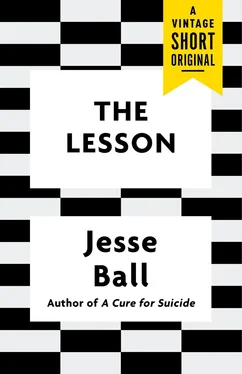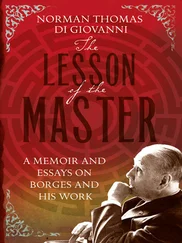— Are there many of them?
— No, not many, said Loring. Of course, the bad ones don’t get very far.
She laughed.
— No, they don’t get very far at all.
— But are there any around here?
— There was one, a good one, but I don’t think he performs anymore. His theater was in a city nearby here. He was the only act that performed there; all the rest of the time, the theater was shut and no one could go in.
— Oh, I should just love to see it!
— It is something.
— What was his name?
— Dardanelle. Theodore Thomas Dardanelle, sometimes known as Menduus. He had one other amazing trick — with a broom, that I have never seen anyone else do. But I won’t ruin it for you. Perhaps one day you’ll see him, or someone else — one of his apprentices, do it. In any case, the time has come for us to play our weekly match. To the board!
Stan sat at the board. Loring sat.
The hands of the clock spun! Pieces fluttered and stood, and gathered at the corners of the table, sullen white and disconsolate black.
Soon, the boy had lost four more games.
— Next week, said Loring, we will talk about blindfold chess.
The doorbell rang.
— And here is your mother.
Stan stood, and crossed the floor. As he passed by the photograph of Ezra, it would not have been hard to suppose that there was some resemblance between the two.
Stop there, thought Loring.
Stan stopped, and stood for a minute.
— Goodbye, he said.
Between Two Sheets of Paper
may be found any number of curious things. And this is the magic of an envelope, to seal away an idea and give it direction; it is sent from one place to another, from one person to another, and either of them, or neither one, may be alive at the time that it is read. Or perhaps one is, and the other is not. That is likely to be the most interesting of the various possible scenarios. Imagine for instance, that I was a general, and I wrote a message and sealed it, asking another general for help. Send troops, I might say. We are hard pressed. Immediately thereafter, we are all killed. I myself am killed in the very tent where I wrote the message, sitting in the very chair where I sat when I wrote the message. It would have been a lovely and most precise tent — of canvas and wood, with a pallet for snatching what rest I could. The flap to the tent would fly open and the colors would be wrong. I would see immediately that the soldiers entering were wearing uniforms terrible to my eyes. Then I would be bayoneted and the trinkets would be stripped from my body by the fierce enemy. My head would be cut off and hung from a cavalryman’s saddle. Some hours later, in some other part of the landscape, the general to whom I wrote, an old friend, would receive the note. He would see my hand, for I would have written to him many times during my life, and he would remember it with fondness. Why, of course, he would say. Even though I have too few men for my own purposes, why, of course, I will send them. But then the news would come that my head has been posted on the gates of this or that city. Can you imagine the sentiment with which he would behold my message, reading it then for a second time?
Yes, Loring was a letter writer, and she had written many letters in her life, both to the living and to the dead, to famous figures, and to, when she herself was famous, obscure jumpers-up. She had cried onto the paper of some, bled onto others in camps and wartime hospitals. She had hidden letters in cans, and buried them, just over enemy lines where they could be reclaimed by partisans, or at the very least, she had imagined doing so. Oh, she was familiar with the letter in a way that we can scarcely know it.
And so I say, that when she sat down to write out her plan in a letter to her deceased husband, about her deceased husband, in his incarnation as a child who was now her living student, it may be understood that she was fully in possession of all the equanimity that might be had in such confusing circumstances. The letter follows.
The Letter, as You May Imagine
was very reasonable. That is, there was a lot of reasoning in it.
e.
It is now certain to me that something has happened. What it is, I do not know. If it is possible to write to you, to speak with you, as I always have done, when you are in some sense my adversary, hiding in plain sight, who can say? I will try it by imagining you, as I always have, as my dearest friend, and thinking that, if you hide, it is only because things that are clouded for me are equally clouded for you.
I want to be sure that what I believe is true.
My plan is as follows:
1. To try to speak through the boy, to you.
2. To try to plumb the boy’s memories, and see if he can recall anything that you or I know or knew.
There is a child’s song about a man in a marsh who is sinking out of sight. Do you remember it? I used to sing it sometimes, even though the tune is dreadful.
The man is sinking slowly out of sight and a woman who is passing sees him. She is too far to save him, but she asks for his hat, and then asks for his shirt, and for his watch and watch chain. The man throws his hat to dry ground and his shirt and his watch and watch chain. But he cannot come himself and he cannot be saved. The woman says something like:
if I’d a length of rope, I’d throw it you,
and drag you out right quick—
but i can’t and so
instead you should
throw me your walking stick…
Then the man says,
if you’d a length of rope, you’d throw it me
and save my life right quick—
but you can’t and so
as i sink i throw
to you my walking stick
Ezra, am I sinking? Or are you?
yours,
l.
PS I remain confused about what it would mean if the boy IS you. Would then the things about him that are unfamiliar to me be things that were true about you, but that changed over time, so that when you met me they had all vanished? In that sense, would I now be discovering the last of you — to find a whole that had always been lost to me?
One day before the Fourth Visit is to happen, a knock comes at the door. It is Stan’s mother, and she is carrying a long metal box full of needles
— Come in, said Loring. It was to be raining, but apparently it is not.
— It isn’t raining at all, agreed Stan’s mother.
The two stood looking at each other. Finally, Stan’s mother spoke.
— I wondered, could you tell me how Stan is doing? I didn’t want to ask you when he is around. This is the first time he’s really been away from home for any length of time, and certainly the first he’s been with a stranger.
— I’m not really a stranger, said Loring. Not to him.
— No, of course not. Of course not. But I was wondering…
— Yes, well, he is a…
At this point it occurred to Loring that this was her chance to learn things about Stan that he himself did not know, or would not tell. But, which to ask first?
— …he is a shy one. I wonder, do you know, does he get on well with other children?
— Not well at all. They like him well enough, but he won’t bother with them. He would rather sit indoors and read.
— And his father, said Loring. What’s their relationship?
— Good, said Stan’s mother curtly. Do you have any reason to suppose it’s not?
— No, no. No, no, no. I am just trying to think of the boy, to know him better so that I can teach him properly.
Stan’s mother nodded her head slightly, still not entirely reassured.
Читать дальше












